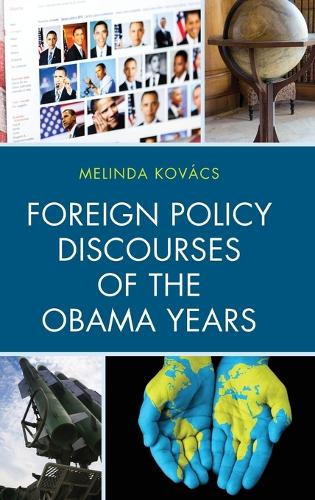
Foreign Policy Discourses of the Obama Years
(Hardback)
Publishing Details
Foreign Policy Discourses of the Obama Years
By (Author) Melinda Kovcs
Bloomsbury Publishing PLC
Lexington Books
18th December 2017
United States
Classifications
Professional and Scholarly
Non Fiction
327.73
Physical Properties
Hardback
176
Width 159mm, Height 237mm, Spine 19mm
440g
Description
For any action in foreign policy to be possible, it has to first appear as plausible in the spoken and written discourses of foreign policy. This is the basic axiom at the core of the case studies that Kovcs carries out in Foreign Policy Discourses of the Obama Years. In each case study, she investigates discursive products such as presidential speeches and news accounts, with the purpose of teasing out the types of meanings that emerge. These meanings, she argues, have an impact on the types of foreign policy action the Obama administration could plausibly undertake. The findings show both that foreign policy in the US is mostly understood and evaluated in terms of its impact on domestic politics, and that the study of discourses surrounding foreign policy is a useful tool for assessing administrations.
Reviews
Kovacs insightful book illuminates Obama-era foreign-policy discourses on a wide range of subjects, including Afghanistan, Benghazi, Iraq, ISIS, Russia, Ukraine, and Syria. Kovacs nimbly biopsies and dissects those bodies of discoursein presidential speeches, partisan Congressional debates, mainstream media coverage, and even enemy propagandato explore a complex web of meaning that both enables and constrains U.S. foreign-policy action. Bismarck told us that politics is the art of the possible, the attainable; Kovacs shows us how foreign policy actions are made possible, and plausible, by the webs of words and meaning spun in the political sphere. Further, her work ably highlights how even the most carefully crafted discursive strategies can spin, or be spun, out of controla phenomenon that takes on new urgency in our brave new world of fake news and impulsive presidential tweets. From red lines to headlines, this timely book artfully combines observation and interpretation to reveal key themes involving 21st-century U.S. global leadership and military interventionism. -- Jonathan M. DiCicco, Canisius College
Wittgenstein's lessons on logic return to haunt the US national state in Kovcs' crucial contribution to a critique of capitalist democracies. -- Salvatore Engel-Dimauro, SUNY, New Paltz
Author Bio
Melinda Kovcs is assistant professor of political science at Missouri Western State University.
